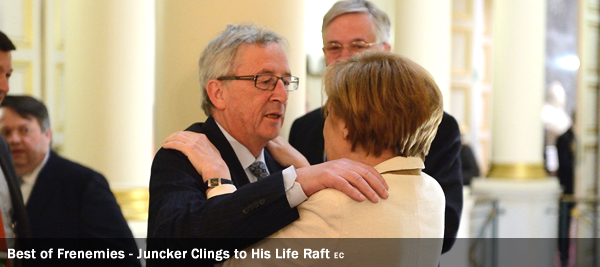Who’s going to be European Commission President for the next five years? Will European Council and Parliament respect the Lisbon Treaty? Will Europe’s votes have any impact on the final outcome? Will Jean-Claude Juncker call it a day and bow out quietly?
On paper, the winner of the elections was the European People’s Party, whose candidate Jean-Claude Juncker said he was “ready to be President of the Commission”.
But without a majority, the Presidency of the Commission hangs in the air, and the next Commission President will probably be the result of a coalition agreement, as German Chancellor Angela Merkel said – but what kind of coalition? Moreover, in the last Informal dinner of Heads of State and Government United Kingdom, Hungary and Sweden seemed to refuse Juncker as a President of the Commission, mainly for his federalist ideas.
Jean-Claude Juncker is the former Prime Minister of Luxemburg and former President of the Eurogroup. He had, to be polite, an irregular campaign, exporting an image of a politician far away from the voters, barely connecting with everyday people. His past in the Eurogroup and support for austerity drained popular support from his campaign.
The Lisbon Treaty states that the European Council should make a proposal to the Parliament taking into account the results of the elections. The EPP won the elections, although a majority in the Assembly should be sought, therefore, Juncker should be the one that the Council proposes to lead the Commission. Despite this, the Council has played an opaque role that does not help the external image the European Union aims to show. Thus, if the Council does not follow the Treaty’s guidelines, it will definitely have immediate consequences on the trust of European citizens in the institutions and the next European Elections.
This year has been the first since 1979 (European Parliament’s first elections), in which turnout has not decreased. If the European Union does want to demonstrate that “this time is different”, it should end with the ambiguities amongst institutions. Citizens will feel more involved, aware that being part of the European Union brings more positive inputs, rather than negative; and it will certainly bring more democracy to the Union, which is supposed to be its cornerstone.
In all debates, candidates agreed that if the candidate proposed by the Council is not a result of citizens’ votes, it will have consequences on the EU’s legitimacy.
Martin Schulz (S&D), Guy Verhofstadt (ALDE), Ska Keller (Greens) and Alexis Tsipras (GUE) have also been competing for the top job, but though most of the field are unlikely to get it, their presence in the competition continues to shape the narrative.
“The next President of the European Commission is in front of you”, said a very convinced Schulz in the last debate between candidates. The German socialist candidate is a self-made man, former mayor, councillor, bookseller and football player, without superior studies.
The candidate with seven lives held a very strong campaign, particularly active on social media –having more than 108,000 followers on Twitter-, although he was accused by the EPP of using the same account as President of the European Parliament that he used as a candidate.
Schulz tried to demonstrate he was a different politician, who wanted things to change and opposing austerity: with the aim of establishing a Commission with gender equality, the fight against fiscal evasion and the creation of young employment. “I want to be the President of the Commission, as a result of Europeans’ vote”, was his motto during the whole campaign. However, he convinced in Germany, his home country, but not in Europe, where he has lost 7 seats, compared with last elections.
Guy Verhofstadt is the former Prime Minister of Belgium, President of the liberals in the European Parliament. It was not his first time attempt to be the President of the Commission, he was a candidate in 2005, but Great Britain used its right of veto, probably afraid of his willingness of a more integrated Europe. He is a convinced federalist, he wrote a book in 2005 called ‘The United States of Europe”, and he also funded the Spinelli group, an organisation that promotes a federalist Union.
However, during his campaign he didn’t openly talk about a federal EU, although he repeatedly said his goal was to become the new Jacques Delors. “A very smart socialist”, he stated.
The only female candidate to run for the Commission is Ska Keller, from the European Greens. At 32 years old, her energy and broad appeal were the surprise of this electoral campaign. She has been a Member of the European Parliament since 2009, specialising in justice and migration issues. In January 2014 Keller was elected along with French MEP, José Bové, to be co-candidates to lead the Commission.
She was very active on social media, connecting with young voters and opposing austerity, because, she said: “We [the Greens] don’t want a Europe for the banks”; but unlike the European Left, the Greens have given alternatives”.
Also a candidate to lead the Commission, Greek Syriza leader Alexis Tsipras, from the European United Left.
Tsipras’s party, won the European elections in his home country, but, like Juncker, he didn’t run as a Member of the European Parliament. His campaign was mainly focused on Greece, and the consequences of austerity in Southern Europe.
“We are going to kick the Troika or Catastroika [sic] out of the institutions”. This sentence exactly resumes what the European left was fighting for during the campaign. Tsipras mainly talked about austerity, and the creation of “a new Europe”, although he never explained how.
Many European leaders, like Herman Van Rompuy and Angela Merkel, have already said that Commission President could not be one of the candidates. But, this is politics, and this is Europe – the opinions of 28 Member States will be considered, some more than others – anything could happen, but the first female European Commission President is looking like a safe bet.
